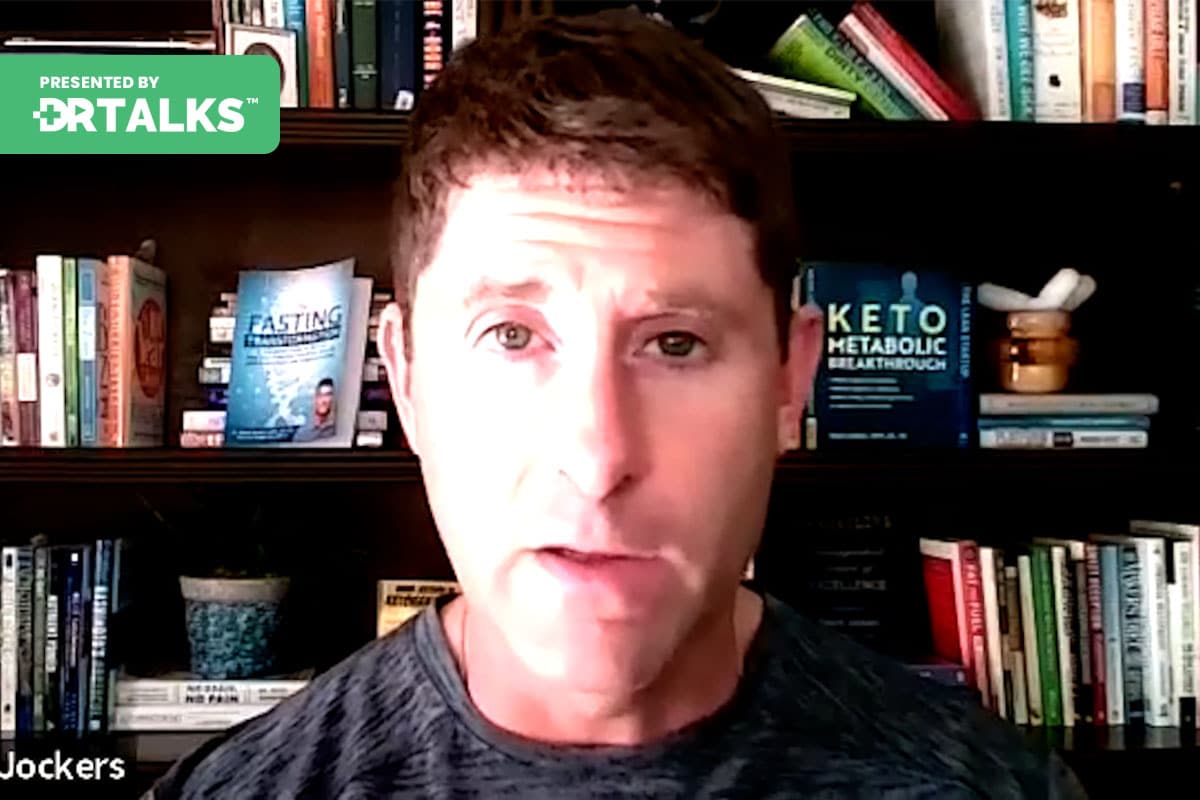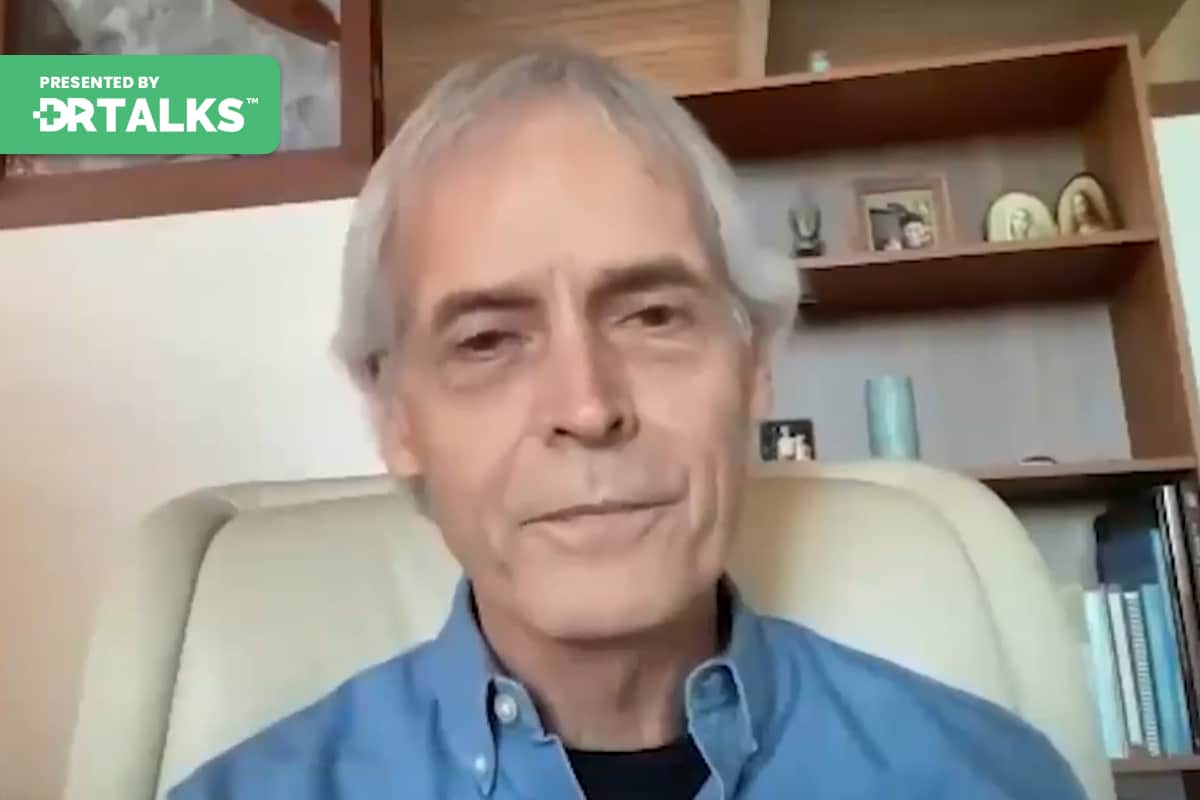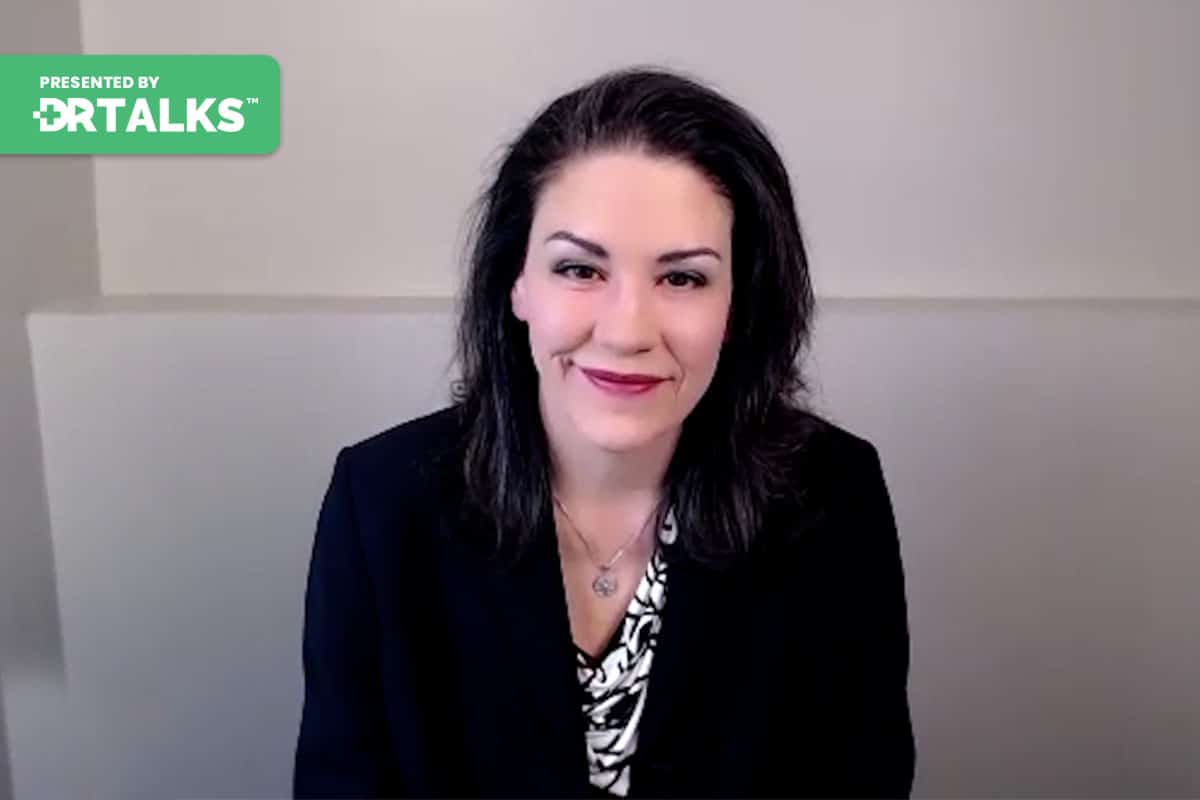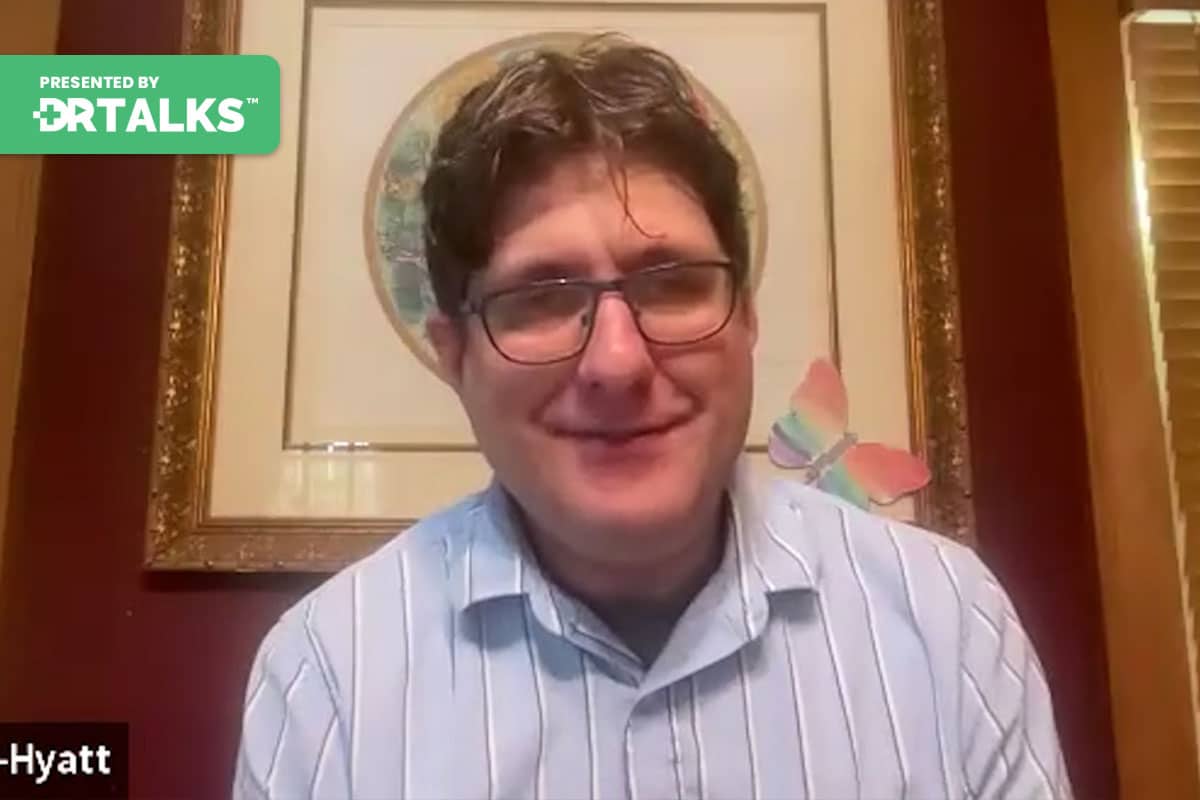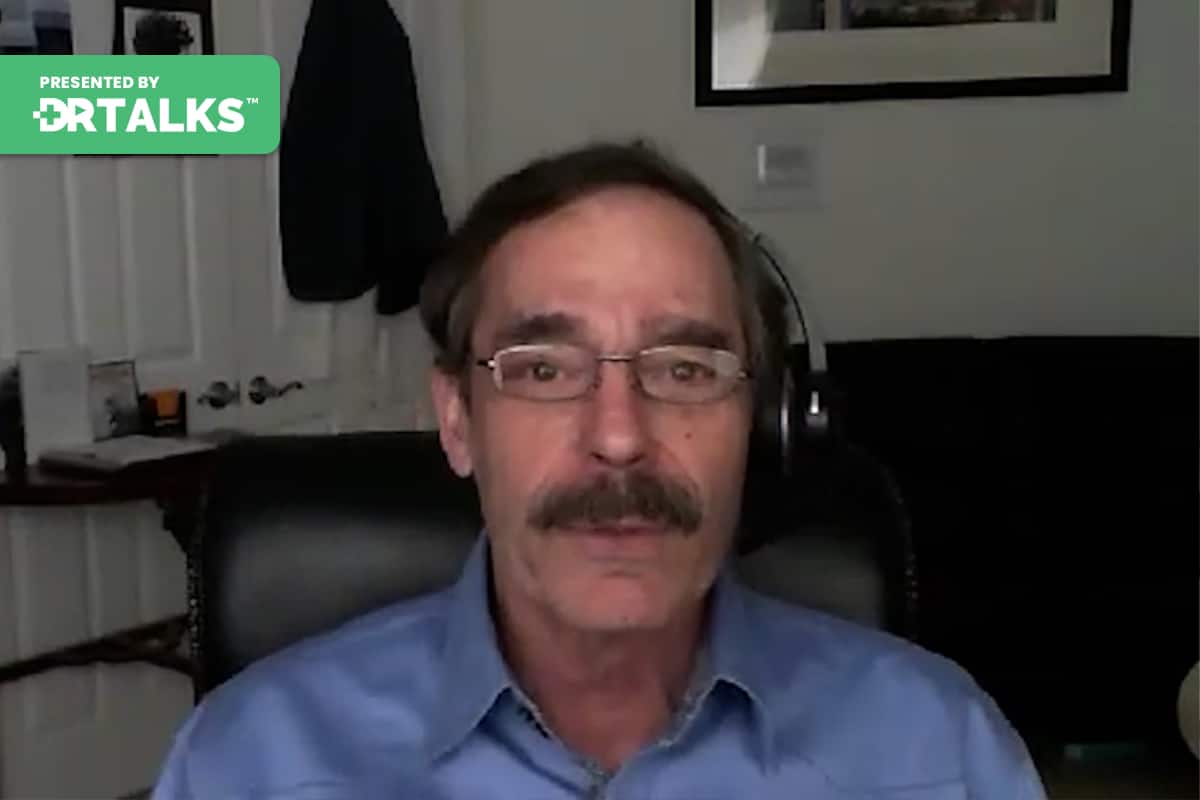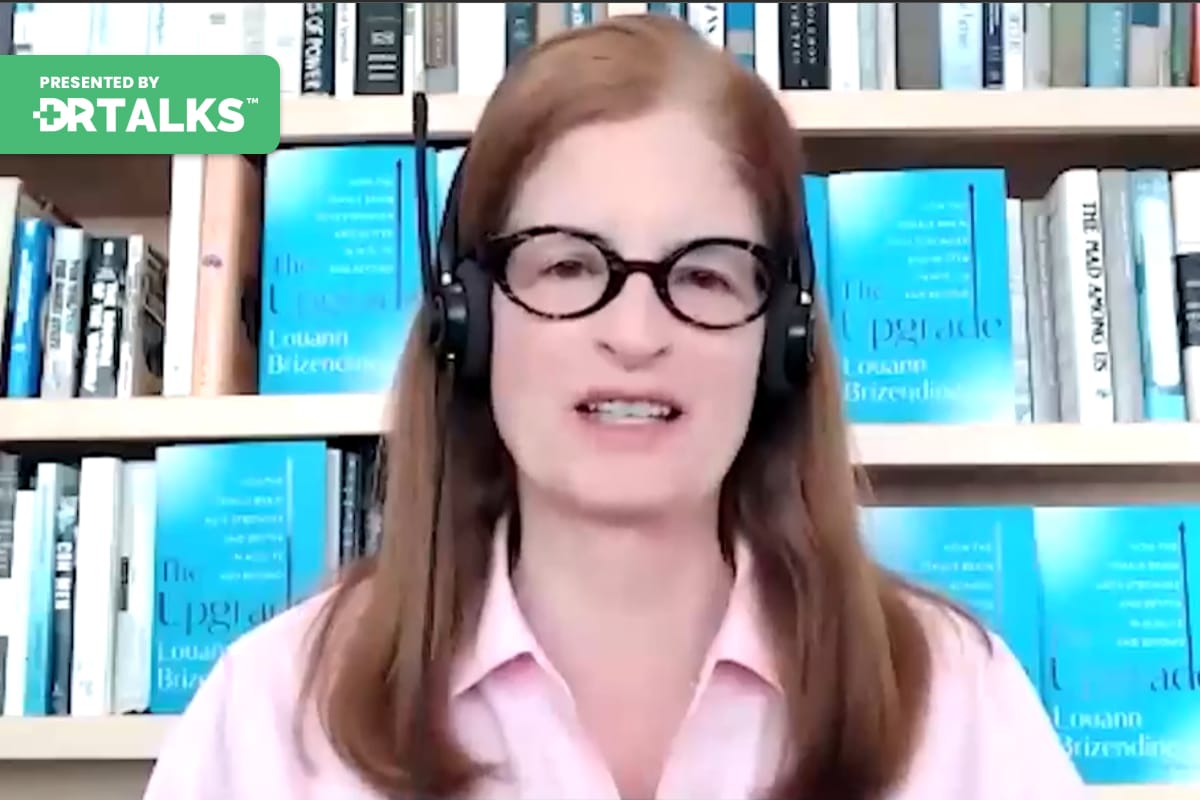Join the discussion below

Dr. Heather Sandison is the founder of Solcere Health Clinic and Marama, the first residential care facility for the elderly of its kind. At Solcere, Dr. Sandison and her team of doctors and health coaches focus primarily on supporting patients looking to optimize cognitive function, prevent mental decline, and reverse... Read More

David Jockers, DNM, DC, MS is a doctor of natural medicine, functional nutritionist and corrective care chiropractor. He is the founder of Exodus Health Center in Kennesaw, Georgia and DrJockers.com, a website designed to empower people with science based solutions to improve their health. Read More
Dr. David Jockers discusses how to optimize your mitochondrial function with diet
- Learn about the best and worst foods for your mitochondria
- Discover advanced nutrition and intermittent fasting strategies
- Discover herbs and supplements that may enhance mitochondrial function
- Learn about how to use light to optimize your mitochondrial health
- Discover groundbreaking biohacking strategies to optimize mitochondrial health
Heather Sandison, ND
Welcome to this episode of the Reverse Alzheimer’s Summit. I’m so delighted to introduce you to Dr. David Jockers today. He is a doctor of natural medicine and runs one of the most popular natural health websites drjockers.com which gets over one million monthly visitors. And his work has been seen on popular media, such as Dr. Oz Show, also at Hallmark Home and Family. I’m really delighted for him to share what he learned about the ketone metabolic breakthrough. He is written a book about it and also about fasting. He is written the fasting transformation. He is a world-renowned expert in ketosis. And you already know from hearing other episodes of his podcast that I am also a fan of ketosis and how I have seen it clinically just transform people’s lives and cognitive function. Dr. Jockers, welcome.
David Jockers, DNM, DC, MS
Thank you so much, Dr. Sandison, and really appreciate you, and thanks for all the great work you are doing.
Heather Sandison, ND
So you really connect the dots between mitochondria and ketosis as well as fasting to walk us through that. What are the connections? How does this work?
David Jockers, DNM, DC, MS
Yeah, well, you see, when it comes to metabolic health, our body really can run on two major energy sources. One is glucose or sugar and we measure that, we look at our blood glucose. And then the other is fatty acids. And I say two sources, but it is kind of like two A and two B. So we have fatty acids and then we also have ketones, which are these water-soluble molecules that are smaller. They are shorter than fatty acids. And the interesting thing about ketones is they can cross the blood-brain barrier. You see in times of famine, our body, our blood sugar will go down in our storage of sugar, which we store sugar in our muscles, in our liver. We call that glycogen. When that would go down, our ancestors would start to burn fat. And we do it as well. Our body is metabolically adapted to be able to burn fat for fuel. However, we can not get these fatty acids across the blood-brain barrier. So our liver takes fatty acids, converts them into ketones, and now they are able to cross our brain barrier where they are a great fuel source for the brain, particularly the mitochondria in the brain. And so going back to this idea of these kinds of dual fuel sources. Most people in society are burning sugar for fuel primarily. We are all burning all of these at all times, primarily sugar and fat. However, most people are stuck in chronic sugar-burning mode. This is because in our society we have plenty of food and we are constantly eating. And particularly we are eating processed foods and higher carbohydrate foods. And so every time we eat, we are getting a lot of this, we are breaking down these foods into glucose or our glucose is going up. We have this hormone called insulin that comes out. Insulin’s job is to take sugar, take glucose out of the bloodstream, and put it in the cells. It also brings nutrients into the cells like magnets, calcium, and a lot of key nutrients into the cell as well.
And when insulin is elevated, we can not burn fat for fuel. So it inhibits lipolysis, which is the breakdown of fatty acids for energy. So we all have kind of this key threshold for how much insulin is in our blood to where we stop being able to burn fat and create ketones. And so, again, most people are eating every few hours and are eating foods that are higher in carbohydrates, causing more and more insulin to be released. And then over time, they develop insulin resistance with the cells, stop responding as well to the insulin, and now they are producing more and more and more insulin. And so they never really get into a good fat-burning state. And this is really where the ketogenic diet or intermittent fasting comes in because, in our society, our ancestors did not have to do this.
They did not have to be intentional about getting insulin down. They did not think about it. They just ate when food was plenty and they did not eat when food was not around or they ate very little when food was scarce. And so because of that, they went through seasonal periods where they were feasting and increasing insulin and then fasting or undereating and decreasing insulin and getting insulin under this threshold where they would burn fat. And when they were under that threshold for any length of time, their body had to create these ketones so we had this alternative fuel for the brain. In our society, we have to be intentional about taking breaks from eating, and we also have to be intentional about what we are eating in order to allow our body to burn fat for fuel and to create these ketones.
And the interesting thing about ketones is that when they get into the brain, they are what we call epigenetic modulators. What that means is they actually modulate our genetic expression, so they actually influence the way our genes express themselves, particularly in the brain. And that is really important because we have, we all have certain genetic expressions. And when those genes, certain genes are turned on and certain genes are turned off, that can lead to chronic inflammation in the brain, for example. But when we get the ketones up, it inhibits inflammation. In fact, it turns down something called the neuro inflammasome in the brain, which is like an inflammation amplifier. We know inflammation can be great short term because it helps prevent against microbial infection and this is something that use to kill our ancestors. They use to get meningitis, they use to get pneumonia, and it kills. I mean, it still kills a lot of people but more of our ancestors died from chronic systemic, not chronic but systemic infections. Infections that can spread wildly throughout their body, went into major organs like the lungs causing pneumonia, or the nervous system causing meningitis or encephalitis, and killed them. Then today, we do not see that as often unless people are very elderly, maybe in nursing homes and stuff like that. But outside of that, it is not as common. And so we need inflammation, but we need to keep it under control. And that is really what getting ketones elevated in our bloodstream and into our brain really does for us it turns off the inflammation amplifier and allows the immune system to be more balanced and coordinated in its attack. And that is extremely critical. It also tells the mitochondria within the cells to double basically or to create. It turns on what we call mitochondrial biogenesis or the formation of new mitochondria, and it turns on something called mitophagy. Where we break down old damaged mitochondria area and actually take the raw materials and create new healthy mitochondria. And the reason why this is important is the mitochondria produce all the energy within the cells.
And they are also kind of like energetic sensors or environmental sensors where when they feel like we are in a survival state when we have a tremendous amount of stress, a high toxic load, and a high amount of pathogens. They will actually shut down energy production and they will become pro-inflammatory. However, when they are in a healthy environment or when they sense that the environment’s healthy, they stop doing that and turn up energy production. And that really allows us to thrive. So when we think about mitochondria in the nervous system and in the brain, this is the most dense area for mitochondria. Actually, we have about ten, what is it, 10,000 mitochondria per neuron which is amazing. In our muscle cells, we have about a thousand a liver we have about 2000 hearts. We have about 5000 mitochondria per cell.
And so the brain is so dense with these mitochondria and they are so critical for our mood, our memory, and our ability to think sharply and quickly. Our cognitive acceleration, and our ability to sleep well even can be impacted by overall mitochondrial health. When we have mitochondrial dysfunction or a buildup of older damaged mitochondria, we call those senescent or aged dysfunctional mitochondria. They are metabolically inflexible, so they can only burn sugar for fuel and they produce a ton of oxidative stress like they rust us or age us much faster and they turn up inflammation in the body. And so we think about neurodegenerative states. Neurodegeneration, whether it is dementia or Parkinson’s, or Alzheimer’s disease. This is marked by high levels of oxidative stress, chronic inflammation in the brain, and mitochondrial dysfunction.
So going back to this idea of ketones elevated in the bloodstream turns off the inflammation, turns down the oxidative stress, and also turns up the healing and the repair process of these mitochondria and the overall number, the density of them, and overall health of the mitochondria. And really, if we were to break down the quality of our life and we were to look at it at a cellular level. The quality of our life is really going to come down to the amount of young and stressed-resilient mitochondria. The more young and stressed-resilient mitochondria that you have in your neurons and really all the cells of your body, the better the overall health expression you are going to have. So when it comes to the brain, you are going to able to think sharper, quicker, have great cognitive acceleration, really good mood. You are going to able to control your mood much more effectively. You are able to sleep better. You are going to be able to be able to recall things much quicker and perform better in your overall day-to-day life. You are going to have more energy. We think about energy day-to-day energy when people say they are fatigued or they do not have any energy, that is really a mental, it is really a cognitive state. Like where do we control our energy? It is like, is it in our hearts? It is really in our brain. It is kind of a perceived feeling of fatigue or a perceived feeling of, hey, I feel good. I feel like I can perform well. I can feel like I’ve got a lot of energy today that comes down to mitochondrial health, particularly in our brain, but really throughout our whole body. And so ketones are one of the tricks. Getting the ketones elevated from time to time. I’m not talking about it, we do not do this all the time. In fact, variability in our metabolic state is actually a really healthy thing and actually makes us more what we call metabolically flexible. Our ability to burn fat but also burn sugar when we need to burn sugar for fuel.
And like, for example, when we are exercising at a high intensity and we do not have enough oxygen, we need to burn sugar for fuel. That is the advantage of burning sugar, is that we can produce energy quickly and we do not need oxygen. The disadvantage of it is it produces a lot of oxidative stress and it does not produce, it is not as great as an energy producer. We can produce energy quickly, but not as much energy as we can when we burn fat for fuel. So fat is a more cleaner, energetic fuel, but it depends on oxygen. And it is also taking longer, it is not as quick. Sugar is very quick but not as efficient and dirtier. Meaning that it produces more of this oxidative stress. But we want to be good at burning both. And so we want to have that metabolic flexibility. And so intermittent fasting as well as practicing something like a ketogenic diet really helps us with that.
Heather Sandison, ND
So to connect the dots between intermittent fasting and the ketogenic diet. So even if you are not in ketosis, would you want to get into intermittent fasting or does that increase the sort of blood sugar rollercoaster that we might be on? And could that potentially be more stressful than beneficial?
David Jockers, DNM, DC, MS
Yeah, that is a great question. So if you were to take somebody that is, let’s say, on a very high carbohydrate diet that is eating 16 hours a day, meaning that they consume their last meal like some sort of food with calories or even a drink with calories at, let’s say nine, 10 at night. And then they are consuming food at 6 a.m. the next morning. And if we were to take that person and we were say, okay, you need to do a 24-hour fast, right? That would be very stressful on their body. Now, they may get some health benefits out of it, but it’d be very, very stressful on their system and very challenging for them. Kind of like in same with that person, if we just said, okay, cut out all carbohydrates, go on a super low-carb diet right away. We have to compare both of those things, those kinds of dramatic changes in lifestyle, kind of like exercise. If somebody is very sedentary or maybe they just recovered from surgery and we were to say, okay, let’s put you under this bench press and we are going bench press 200 pounds or whatever it is. Because he used to bench press 200 pounds. So you need to do it now. It’d be very stressful for them if we said, you need to go out and run, you know, a 5k today is going to be really stressful and it is going to create a lot of inflammatory oxidative stress in their system. So instead we kind of gently lean into these things and gradually build fitness. Just kind of like if we were to exercise. What do you start with? You start small, you start by just gradually stressing your system with exercise until your body adapts. During the healing process, your body adapts, recovers, and it builds stronger, more stressed-resilient mitochondria. Then the next time you exercise, you are a little bit stronger.
A little bit, you have a little bit better neuro neuromuscular sensitivity and you are better at it. And you notice that you start getting strength increases as you go on, and you recover faster. You are not quite as sore. That’s the same thing with intermittent fasting or a ketogenic diet. We want to kind of gradually shift into these things. And so if somebody is, let’s say they are consuming 250 carbohydrates a day and they are eating this, they’ve got this very long eating window. What we want to do first is start to gradually, let’s say they are eating in a 16-hour eating window, I might cut, I might drop them down to a 12-hour eating window where they are consuming their meals from, let’s say, 7 a.m. to 7 p.m. each day. And then we might cut down their carbohydrates by, let’s say, 50 or 100 grams a day. So instead of going all the way down to 50 grams of net carbs, we might drop them down to 150 or 100 grams of net carbs for the first few days.
So we are taking out the ultra-processed foods were replacing those with healthier natural foods, fruits, and root vegetables. They naturally have carbohydrates but they are healthier. They are more nutrient-dense, not quite as in slow-genic types of foods. And then gradually we might start by saying, okay, for breakfast, as they are adapting to this and they are feeling like, okay, I can do this kind of diet. We’ll say for breakfast, we are going to do little to no carbs. We are going to do a veggie omelet with, let’s say, arugula, eggs, maybe some grass-fed cheese in there, and some bell peppers. So low carb. Okay, they are cooking it on grass-fed butter or coconut oil or something like that. Maybe a little bit of extra virgin olive oil on top. So now they’ve got this very low carb, high protein, healthy fat style meal right here that they are consuming that is going to very do a very good at stabilizing their blood sugar, taking away cravings.
And then they should be able to not notice any sort of hunger or cravings for four or five hours after that. So now what we do is we start to take away snacking. So we go low carb with their first meal takeaway snacking because now they are feeling natural satiation. Their body is getting better at burning fat because that first meal is not insulinogenic. They are not producing much insulin there, so they have better blood sugar stability. So now we kind of trim it into three meals over, let’s say maybe a 12 or even pushing it into a 10-hour eating window. Where now they are consuming their first meal at 8 a.m., and their last meal by 6 p.m. So we are starting to compress the eating window slowly while reducing carbs, increasing healthy fats, and increasing protein. And then we start doing that with other meals. So maybe the next meal instead of consuming a sandwich. Maybe that is what they did every day for lunch, they had a turkey and cheese sandwich. We know that bread is high in carbohydrates, a high glycemic load. We might initially that maybe they were doing white bread we might switch them to like Ezekiel bread for at first. And then as they are adapting, we take them off of that altogether. And now they are doing a chicken salad with extra high, high polyphenol, extra virgin olive oil on it, and maybe some avocado in there. So they got the protein, healthy fats, veggies, and fiber. And so now we are transitioning them there. And then as they are getting more and more adapted and they have better blood sugar stability, less cravings, we can start pushing their or narrowing their eating window, compressing it to eight hours or six hours and possibly even just doing two meals a day rather than three meals. And this is kind of the gradual transition. And this might take a month, right. To transition them into a daily lifestyle where they are fasting for 16, 18 hours, maybe even doing a one day fast once a week and consuming lower carbohydrates, less insulinogenic style of foods.
Heather Sandison, ND
God, that is super helpful. Especially have those examples of what to eat. Now I tell my patients that the Ketogenic diet is not only anti-inflammatory and great fuel for your brain, great for increasing mitochondria production of energy, but also a detox diet. Do you share that opinion?
David Jockers, DNM, DC, MS
Yeah, for sure. Because basically what it is going to do is help us burn fat for fuel. And so, when we think about where does our body actually store toxins? A lot of people think we store toxins in our livers. That is not actually true unless we unless we are developing fatty liver because where we actually store toxins in our fat cells. And so as we start to burn fat for fuel, we are also releasing chemicals and different toxins that are promoting oxidative stress in our system. So the better we are at burning fat, the less toxic load our body is going to hold on to. So this is really, really key. On top of that, we are also going to get into the state of autophagy. We talked about Mitophagy where we are breaking down the old damaged mitochondria. I mentioned that earlier. Well, our body will do the same thing with all the cellular organelles.
So within the actual cell itself that we talked about, kind of outside the cell, we are talking about fat cells. However, inside the cell, we have all these different components and many of them have been damaged. And because they are damaged, they are dysfunctional, they are not working and actually producing oxidative stress that is rusting these cells from the inside. Rusting the actual cellular machinery. So we need to actually get rid of those because they are causing poor cellular health and we need to repair those organelles to create new, healthy ones. We have a whole bunch of things, endoplasmic reticulum, Golgi apparatus, and so they all have important functions. And so when we get into a state of ketosis, our body will start to break these down and will repair those cellular organelles and we get rid of the bad ones. And this is all part of the cell renewing process, which is really a cleansing and detoxification process. So yes, there’s definitely a detoxification, cleansing component, a healing component. Really, a way to think about it is our body can either be building or healing and repairing. And so when we are building, that is when we are in like a feast state and that is marked by higher levels of insulin. And there is a time and a place for that. It actually tells, for example, our thyroid hormone to produce the right amount of thyroid hormone because we need to have really good metabolic machinery. We need to turn up energy production. It turns out it helps helps our body to be more sensitive and be able to produce more sex hormones, testosterone, estrogen, progesterone. However, in order to really produce the proper amount of hormones, we also need very good insulin sensitivity. So we get that by going through periods of famine. And that is where the ketogenic diet fasting come in. And when we are a child or we are young, the younger we are, the more times of feasting we need to be in because the more growth and building we are in. When pregnant, when a woman is pregnant she needs to be in growth and building for the most part that is why she eats a lot and she eats all the time.
However, once we get to an adult state, we need very little time, a very few times of feasting. Maybe a few hours a day and then a lot of hours, maybe 20 hours a day, 18 to 20 hours a day where we are telling the body, hey, we are now in healing and repair mode. And so we need to prioritize that. We really shouldn’t have insulin elevated above that certain threshold for more than maybe four or six hours during the day. And so by getting insulin up but then down right for a lengthy stay on it on a day to day basis, that is how we tell the body when to heal and repair and when to build and build new hormones, build new cells, go through cell reproduction. So this is this kind of this little dance. But for most people are listening to this, most of you, 99% of you are in a state where you need more repair, more healing and repair than you do feasting on.
Heather Sandison, ND
Most Americans because food is just available. So let’s go back to that. Super practical information. I appreciate your sharing. We kind of started down this path with our let’s just start with the worst foods. So what do you cut out first?
David Jockers, DNM, DC, MS
Great question. So you want to get rid of all your processed or ultra-processed foods. So if things have a lot of different ingredients, particularly chemical-sounding ingredients, great things to get rid of. Try to stick with real foods, very simple ingredients, all ingredients that you should be able to eat just standalone. That would be that you would eat even if something comes in a can or something comes in a bag. You look at the ingredients, those should all be things that you would eat just by itself. And then if that is the case, then you know that, okay, that is probably a good a good food. And then the other thing is you want to look out for are sugar or anything that really elevates sugar. There is a whole bunch of different things, maltodextrin, sucrose, and things like that. Artificial flavorings like sucralose, aspartame, and the chemical type sounding names you want to get rid of those. You also want to get rid of your processed seed oils. So we used to think these things were healthy. A lot of people would see things like corn oil and they would think, corn so vegetable that is got to be healthy but we know that that is a seed oil. It is really toxic and inflammatory for the body. In fact, it takes a thousand bushels of corn to produce one ounce of corn oil. You could easily get one ounce of corn oil if your salad dressing as corn oil is the main ingredient and you pour that on your salad. And so that is very inflammatory. It is very fragile oil that is extremely inflammatory in the body. You want to get rid of that soybean oil, safflower oil, cottonseed oil, canola oil, peanut oil, and all of those you want to get rid of those those types of seed oils. You want all your fats are primarily your fats to come from grass-fed, organic animal products, wild-caught seafood, extra virgin, high polyphenol, fresh pressed olive oil, avocados, avocado oil, and coconut fats.
So you can get that from my coconut milk, coconut flakes, coconut oil all those kinds of different coconut products. Flax? You know, when we talk about seed oils in general I’m not a big fan of flax oil. Okay. I’m not a huge fan of that. A little bit of flax seed I think can be beneficial. It has got lignans and fibers that can be beneficial for the microbiota but I’m not a big fan of the fats. Number one is it is primarily polyunsaturated fats and they are omega three fats, but they are the small chain omega-3 and the small chain ALA omega-3. Honestly are not overly beneficial because it actually takes a lot of enzymes. A lot of people are not able to convert the ALA component effectively into EPA and DHEA, which are the long-chain omega-3 that have the most benefits. The most anti-inflammatory benefits, and brain-enhancing benefits.
So I prefer getting the omega-3 from your grass fed organic animal products. When animals eat grass, they naturally produce higher amounts of long chain omega threes. Also, your wild caught fish or wild caught Seafood will have higher amounts of omega-3. Also, you can get supplements like fish oil, for example, a purified fish oil that has some sort of antioxidant in it. Like for example, rosemary extract some sort of antioxidant in there to help preserve it. Krill oil is another one that is popular where people are getting that, which has Astaxanthin which is also great, that is actually is powerful antioxidant you find in wild-caught salmon, particularly like Alaskan salmon. And Astaxanthin is an incredible antioxidant that really protects the mitochondria, protects those omega-3 fatty acids. So you might find that in there as well to help protect it and purify it. But that is really where you should be getting your omega-3. You can also get it from like a vegan source of the algae. I’m a huge fan of Chlorella and Spirulina, huge fan of those. I think they are incredible for the body as far as detoxification, bioavailable nutrients, and amino acids. They are very cleansing and healing for the body. And they also have omega-3.
Heather Sandison, ND
They do? I do not think of them as having omega-3 fats. I want to make sure we double click on coconut oil and MCT.
David Jockers, DNM, DC, MS
Yeah, for sure. Well, coconut fats are great and coconut fats are also a natural source of medium chain triglycerides. And medium chain triglycerides turn quickly in the body into ketones, particularly when it comes to medium chain fats. There are multiple, there is C8, C10, and C12, capric caprylic acid, and lauric acid. Okay, now coconut oil is rich and all of those 50% of the fat make up is one of those three. But most, out of that 50%, 35% of that is lauric acid. And lauric acid is C12. It is a very good fatty acids, very good for the immune system. However, it does not turn into ketones quickly, actually does take a lot of enzymes and does take some bile emulsification for that. C8 and C10 capric caprylic acids are much more ketogenic and C8 eight tends to be the one that is metabolized quickly into ketones. What does means is the moment you consume that basically the body turns that right into beta‐hydroxy‐beta‐methylbutyrate which is the kind of this active ketone that we measure in our blood. That is kind of a measurement tool that we look at for your overall ketone levels. Rates is very quickly metabolized into that. It also has an antimicrobial effect really good for breaking down yeasts, the outer cell wall of yeast.
Some other additional benefits there. And so coconut oil is a natural source. And coconut oil, some people do amazing with that, of course. I know, you know, with Dr. Bredesen’s work, there are certain genetic types that do not do as well by the APO force do not do as well with a higher coconut oil diet. But coconut oil is a natural source of these. And some people have done amazing just using coconut oil for improving their brain health and helping to reverse Alzheimer’s and dementia. But it would be good to work with somebody like you to look at a genetic type, to see how your body’s responding to all the saturated fat that is in the coconut oil. And then you can also do a concentrated C8 only MCT oil, which again turns right away into ketones.
And that can be really, really powerful for the body. In fact, I know there was a study. Where were they, all they did was add MCT oil, but I think this is probably a C8, C10, and C12 oil, but that is all they did was add that to all these people who were in a nursing home and they were just consuming the standard nursing home diet. Which, you know better than anybody is not healthy. Certainly not going to help prevent Alzheimer’s. He is going to promote it, highly inflammatory but what they did was they just added MCT oil to a certain population group and they had significant improvement in their cognitive scores compared to the group that did not get it. So just something that simple can be really helpful. And the reason for that is because of the elevation in ketones and that epigenetic modulation that took place for bringing down inflammation in the brain.
Heather Sandison, ND
Wow. So Ketones, MCT has a way to take something that could potentially increase your ketone level. There are also several types of exogenous ketones. You have your ketone esters and then there are several others that athletes use that can get your normal count of ketones to be really high. Do you have insights on when to use those? How to use them safely, and how to find ones that do not taste like gasoline?
David Jockers, DNM, DC, MS
Yeah. Exactly. So the ketone esters, I have never actually taken those, but from what I’ve heard that they do not taste very good. Although, I know scientists are working on trying different flavor profiles to make them a little bit more palatable and they turn the ketones faster than your ketone salts. So you can get ketone salts which have been on the market for about 15 years almost now, certainly 10 years on the market, and they are marketed as exogenous ketones and those will turn up your your circulating beta‐hydroxy‐beta‐methylbutyrate. So if you are to test your blood ketones, they will go up and there is a good time and place for that. So if somebody is trying to transition their body to get more fat adapted, let’s say again, they were on a higher carbohydrate diet, they have very poor metabolic flexibility, consuming some exogenous ketones or the MCT oil with a meal will help to reduce cravings.
Now the body, it takes the body a little bit of time to get used to seeing the ketones elevate in the brain developing the metabolic machinery to be actually able to use them. It is not like we switch over immediately, but the more frequently that seeing that the more it is going to start to switch that metabolic machinery, and you are going to notice that your cravings go down. So when your cravings go down, even go longer periods of time without food. And then you are probably going to consume less sugary processed foods when you do eat. So what’s that going to do? It is going to create lower insulin levels and better metabolic flexibility, and you are going to be able to produce natural ketones, indigenously produce ketones more effectively.
The real trick there is we want to get the insulin down. And so the exogenous ketones kind of act like a little bit of a crutch or the MCT oil by helping reduce cravings and allowing you to go longer between meals without feeling hungry. So that again helps bring down insulin, and get your body more fat adapted so you are producing the ketones on your own and you are not, and you are also becoming more insulin sensitive. So you are not producing as much insulin when you do eat food. So that is the key there. Now also athletes, if they are doing, high-level competition, they need extra fuel. Their body is breaking down glycogen and stored sugar. But we all already talked about how sugar is a dirty fuel, produces a lot of oxidative stress, and drives up inflammation.
So there are times when they need to be using the sugar, like if they are in an anaerobic state. But a lot of times during these kinds of competitions, they are in a state where they have oxygen right there. They are able to rest and get oxygen but they are competing for long periods of time and so they do need some level of fuel. And so the exogenous ketones are kind of a quick, great fuel source. They can notice oftentimes better mental clarity, and they have what they perceived exertion go down. What that means is the kind of work that would make them feel like, wow, this is super intense, this is my peak. That actually goes down so they are able to work at an even higher clip. So it is been very beneficial for a lot of athletes as they are training to become adapted to be able to use these ketones and then they can supplement with those ketones. People are doing triathlons and all kinds of really intense activities can be really super beneficial. And then there also their recovery time afterward is better because they had less oxidative stress and inflammation from the actual exercise bout and so they are able to recover faster. And obviously, that allows them to have a better experience with whatever that competition was and then also be able to do it again in a quicker and more effective state than if they have not used those.
Heather Sandison, ND
So I think that our Alzheimer’s patients that they are more exercise tolerant in ketose than when they are getting something as an exogenous ketose. For our audience, I’m really curious to learn from you what you think of as in medical speak, the contraindications to going into ketosis. So who would this not be safe for, particularly in a group of people who is a little older.
David Jockers, DNM, DC, MS
Yeah. So getting into just like a mild state of ketosis where your ketone, your blood ketone levels are up over let’s say 1.0 and maybe keeping it. So let’s say between one and two millimoles per liter, that range I think is really pretty much healthy for just about everybody, particularly in the older population. I mean, obviously, you would not, pregnant women should not be intentionally trying to do that for sure. But in general, it is just an adaptive physiological state. So I think that rate.
Heather Sandison, ND
What about with kidney disease?
David Jockers, DNM, DC, MS
You know, even with kidney disease, I do not see that that is necessarily an issue because the body can still filter. In fact, the most damaging thing to the kidneys is higher blood sugar. So when the blood sugar is elevated, the sugar molecules will bind to proteins and they create something called an advanced glycation end product. And these advanced glycation end products are like shrapnel going through the blood vessels and they damage the blood vessels. They damage the tubules in the kidney and they cause further destruction of the kidneys. So getting your blood sugar low, your insulin low, and having your body actually using ketones for an energy source is actually very beneficial for the healing process.
You know, again, these tubules need to undergo a level of autophagy to repair because there is, they are full of scar tissue. So that will actually help the healing process. So I do not actually see that as a bad thing. Now, there may be some things that we need to do. For example, consuming the right electrolyte balance can be important in these in these states. I think that can be that can be critical. So I do not see that though as a contraindication. When it comes to like a ketogenic diet or doing a lot of fasting, if somebody is extremely underweight, we do need to be careful there. If they are saying, if they are making getting into ketosis is their number one goal, that may not be the best number one goal. It can be a nice side benefit. But those types of individuals need to make sure they are consuming adequate calories, and getting a lot of protein in their system. They do need to improve their insulin sensitivity and oftentimes and in many cases but the number one goal is making sure they are getting the nutrients they need, getting the protein they need. So that way they do not lose excess weight because losing muscle tissue as you age, sarcopenia, is a significant risk factor for early death.
Heather Sandison, ND
And then on issues, what we recommend is making sure that you are doing some bioidentical hormone replacement as long as you are working with your doctor, making sure that is safe and appropriate for you. But testosterone especially is going to help with muscle building. That’s the really important part of why to do this entire program. Not just to pick and choose, but because we want to avoid weight loss, particularly in older women who are at risk of osteoporosis and other things. You mentioned electrolyte imbalance so that is really important. Dr. Jockers, this has been such a wonderful, informative conversation about ketosis and mitochondria. I can not wait to share this with our audience. I know they are going to get so much out of it. I’m really impressed by your depth of expertise and knowledge in this space, and it is adding so much value here. Thank you.
David Jockers, DNM, DC, MS
Well, thank you, Dr. Sandison. Appreciate you.
Heather Sandison, ND
Remind everybody how they can find your books and your websites and your podcast. Everything that you have to offer for sure.
David Jockers, DNM, DC, MS
Yeah. You can find me on drjockers.com. J.O.C.K.E.R.S.. Also, my podcast Dr. Jockers Functional Nutrition podcast, and I’m on all the different social media channels, Instagram, Facebook. And then my books are The Keto Metabolic Breakthrough and also The Fasting Transformation. Find those on Amazon.com.
Heather Sandison, ND
Fantastic. Thank you again so much for being here today.
Downloads

